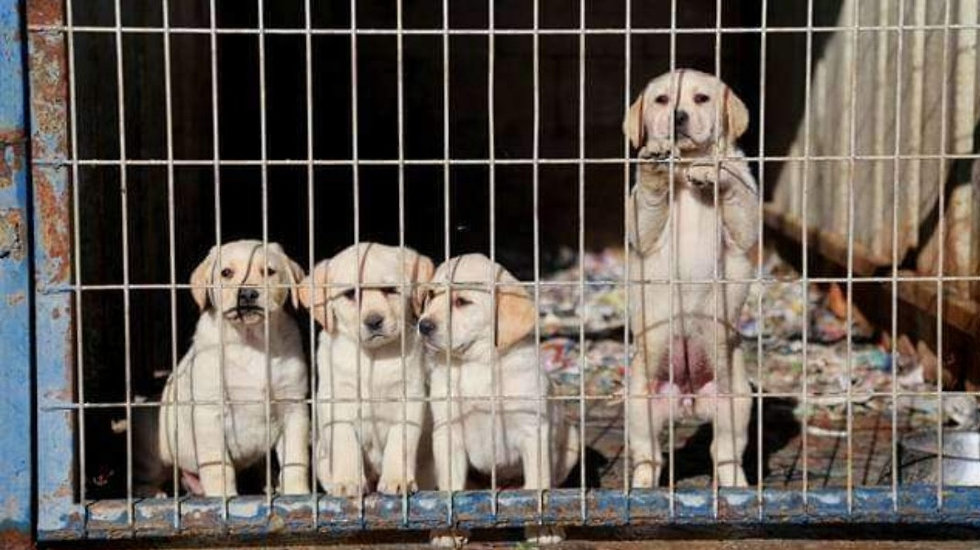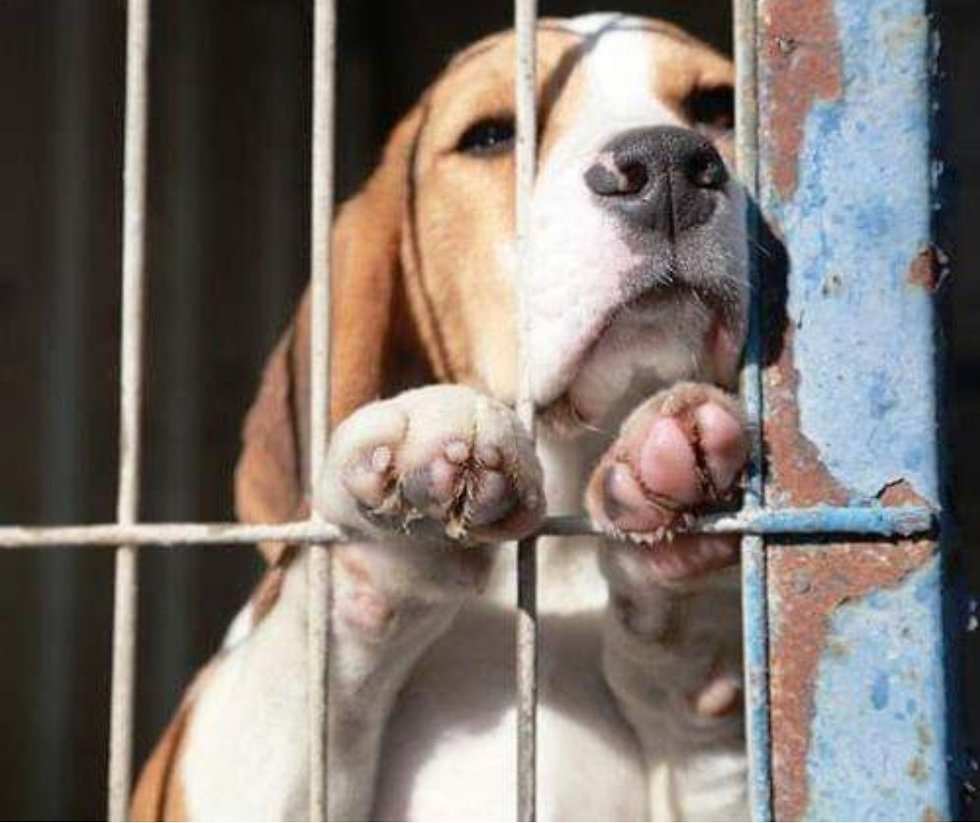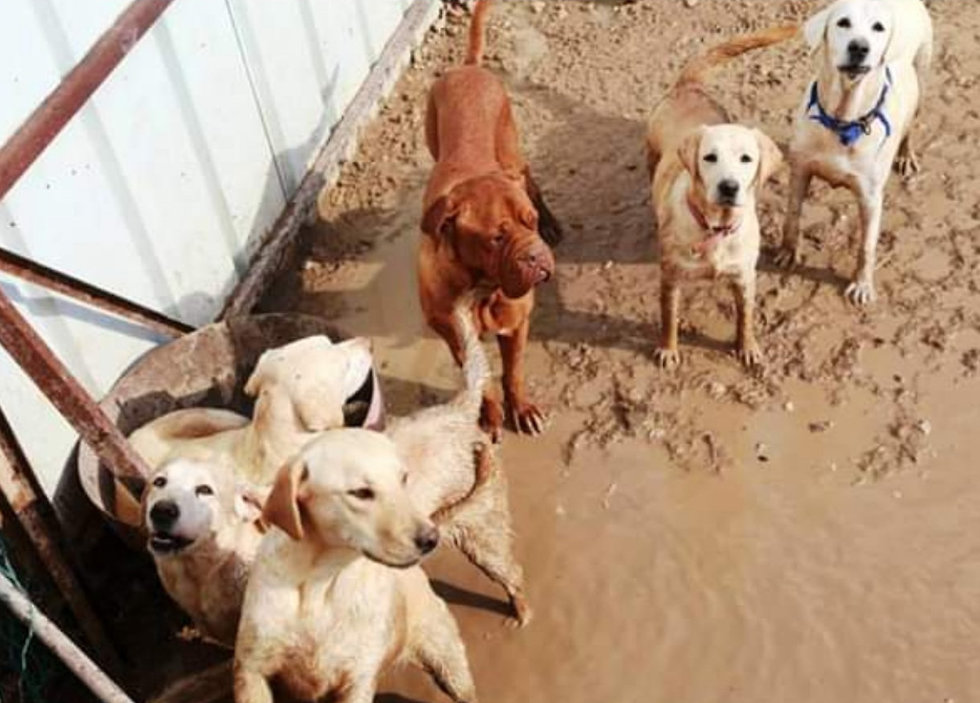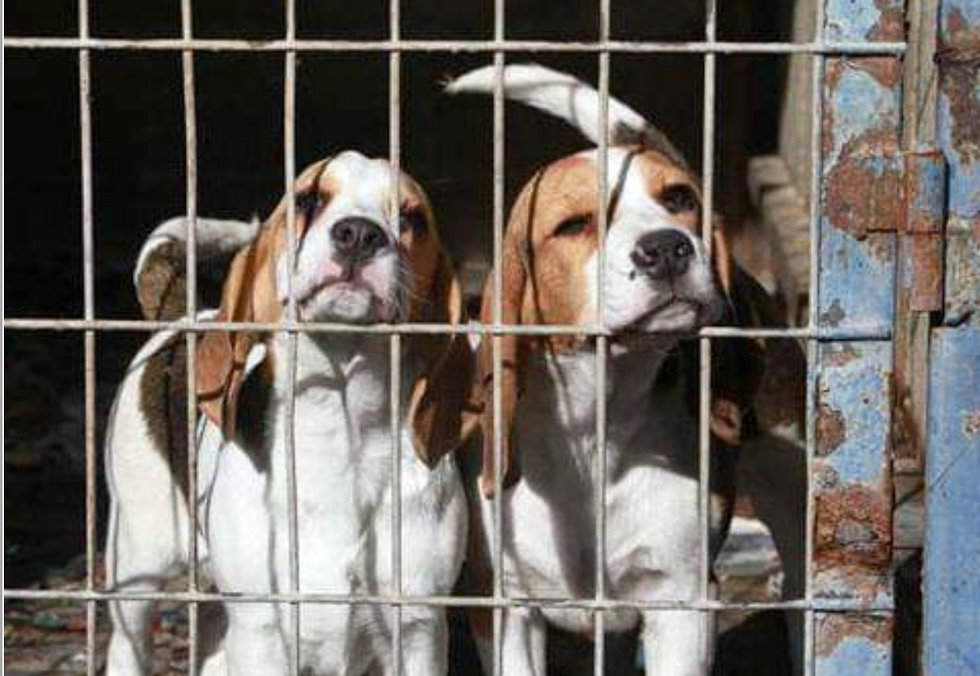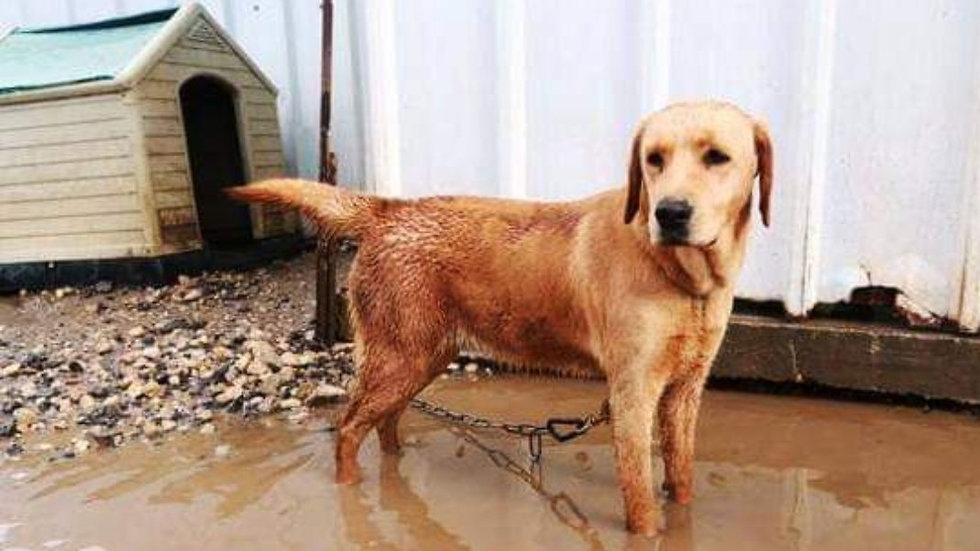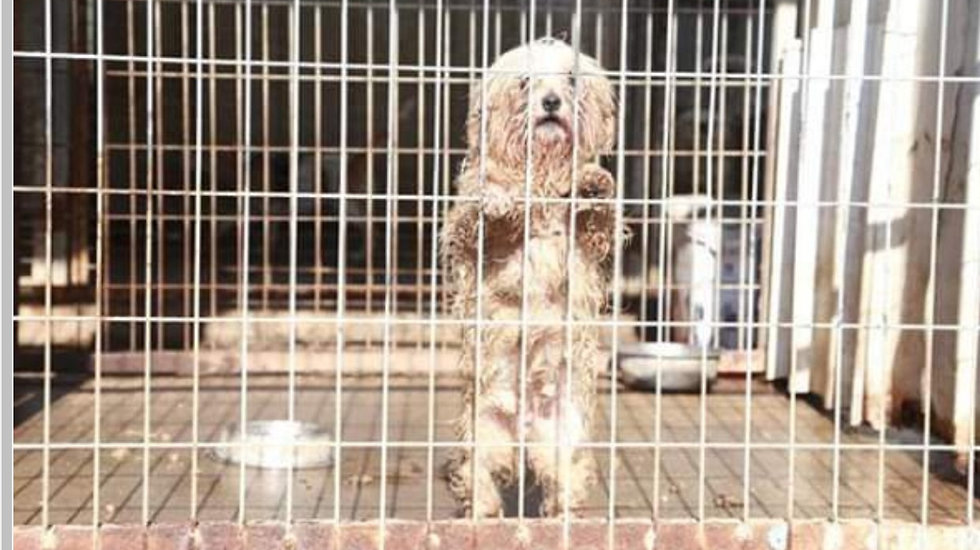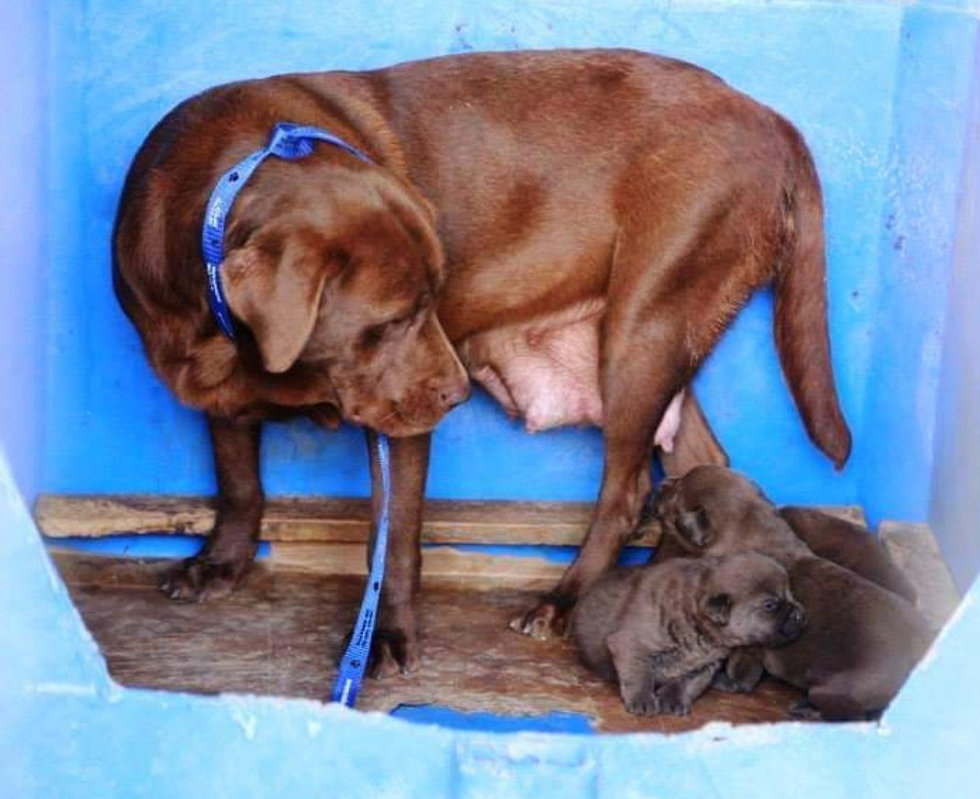
The awful truth behind the puppy mills selling purebred dogs
In recent years, dozens of illegal puppy mills have popped up in Israel, which breed and sell animals they claim to be purebred for thousands of shekels. The dogs suffer from abuse and neglect, but the families looking for a four-legged friend are unaware of that.
While thousands of dogs are abandoned and locked up for months or even years at animal shelters and NGOs that are struggling under the sheer number of dogs without a home, and while every year over 60,000 dogs are put to death just because there is no one to adopt them—the purebred dogs industry continues to prosper and grow, mostly illegally. The only ones to truly profit from this are the sellers.
In other countries, governments are fighting the problem with legislation. Just a few weeks ago, the British Parliament passed a law that bars the sale of pets. This precedent kicked up a storm around the world; and with this Britain joined the US state of California, which also barred the sale of dogs a few years ago.
And what's happening in Israel? Few care about or are indeed aware of the suffering dogs are put through.
An investigation we conducted found how easy it is to sell pets in Israel without a license or papers. The customers, mostly families, are unaware of the wide-scale industry behind the dog they lovingly adopted; or the suffering it went through before finding a home with them.
"So many dogs are put to sleep every year because there is no one to adopt them. So why do people sell animals like objects?" says Yael Arkin, the CEO of the organization Let The Animals Live. "These dogs are going through hell just so someone could make a profit at their expense. We need to put an end to this."
Purebred without papers
Only ten percent of all dogs sold in Israel are purebreds—the rest are marketed as purebred but are not. One of the most popular places to buy dogs in Israel is the market in Kafr Qasim. The sellers keep the dogs in extremely poor conditions at abandoned yards or construction sites far from residential areas, so the puppies' barking won't alert the neighbors to the illegal activity.We contacted one of the known sellers in the north, M., who breeds dogs in Daliyat al-Karmel and sells them at the market in Kafr Qasim. He told us of the kinds of dogs he has for sale.
"I have Maltese and Shih Tzu dogs, but you can only have them in two weeks, because they are still small," he says. "They're not for sale yet. I put them on sale only at two months old. The Shih Tzu is NIS 2,500 ($686), Maltese is NIS 3,300 ($905). They're purebred without papers."
What do you mean "purebred without papers"?
"I don't want to go into too much details. You can come and see them. Come to Daliyat al-Karmel, to my house. I just had two whelpings, you can even come in a week."
A visit to M.'s puppy mill in Daliyat al-Karmel uncovered a sad and abysmal situation: dozens of tiny puppies running around a construction site, without shelter from the cold and rain—and mostly without anyone taking care of them.
The Central Investigation and Enforcement Unit at the Ministry of Agriculture, which is in charge of enforcing the law against animal abuse, already knows M.'s puppy mill and has even visited it before, but its officials determined this was a suitable place for puppies to live in.
"Even after we told the police what is going on in Daliyat al-Karmel, nothing has changed," Arkin says. "Some of the dogs go from there to be sold at stores, under the guise of an organized place. They are sold without papers or permits. In 90 percent of the cases, no one will show you where he breeds the dogs, because of the awful conditions. They meet with you elsewhere, but you won't see the conditions in which the dogs live. They have something to hide."
Can't the neighbors hear the barking?
"In cases of small puppy mills, we receive complaints from neighbors who get pissed off by the barking, because a lot of the time it's at someone's back yard in some moshav. We had one case in which dogs were kept in a warehouse in an industrial area, and people heard barking coming out of there. We went there, but we don't have the authority to seize animals; we can't just come and take them. We reported it to the Agriculture Ministry. In many other cases, (the puppy mills are) in abandoned areas, construction sites or industrial areas that no one visits normally. The dogs live in a structure that is still under construction, in the terrible cold, and when market day arrives they are taken there to be put up for sale."
According to data from Let The Animals Live, there are 61 animal shelters in Israel, each housing an average of 30 dogs. Meaning there is an average of 1,800 dogs waiting to be adopted every day—and this is without counting the tens of thousands of abandoned dogs who are placed at foster homes and alternative adoption centers around the country. There are some 300,000 stray dogs in Israel, 60 percent of which are in the southern part of the country.
When you adopt from an NGO, "you save two dogs," Arkin says. "The dog you adopted and another stray dog, or one who might have been otherwise put to sleep, which take the place of the dog you adopted."
Can you take in new dogs?
"Let The Animals Live has 300 dogs, almost 200 of which are in Kfar Ruth and some are hospitalized. We're the only NGO that takes in dogs that require some form of investment—training, medical care, special treatment. If people don't adopt, I can't take in new dogs. We're not alone in this; all of the NGOs in Israel have more dogs than they can take."
What about spaying and neutering?
"There is a NIS 4.5 million budget to spay and neuter cats, but the Agriculture Ministry is against spaying and neutering, so we go to the High Court of Justice every year to get that budget."
A prosperous industry
Puppy mills are not the only places that sell dogs; there are also private people make some extra money on the side from selling dogs, with some even selling made-to-order puppies to celebrities and promoting themselves on Facebook, Twitter and Instagram. Facebook allows groups such as "Purebred dogs for sale" to exist, and those groups only grow bigger over time.
Several weeks ago, a post made the rounds on social media about Beagle puppies—rare and expensive dogs—who would be put to death unless someone adopts them. The post, which got tens of thousands of shares and comments, led many people to call the phone number written at the bottom. However, it later transpired that the dogs were not up for adoption, but for sale for thousands of shekels. Many people slammed down the phone. But there were also those who fell in love with the photos of the puppies and were willing to pay for them.
Shani Levin, 28, an animal rights volunteer, was among the thousands of people who saw the adoption post on Facebook. But unlike many others, she immediately knew this was a sham.
"For two days, I was bombarded with messages on Facebook about the Beagle puppies that were put up for adoption a moment before they are to be put down," she says. "It didn't appear credible at all, because Beagle is a very expensive breed, which is raised at home and not picked up off the street. There's no chance they were going to be quarantined and put down."
"What angered me the most about this story was the fact everyone rushed to help just because they are purebred," Levin says. "So many people called the guy who published the post, so he couldn't be reached. People paid money to save these dogs, while there are thousands of other dogs waiting for a home. When an NGO posts on Facebook about a dog under quarantine, it gets maybe a few dozens of likes."
The purebred dogs industry "is massively commercialized. They tell people there are papers, that the dog is purebred, and they don't even ask to see the dog's papers," she says.
The breeding industry makes its way to private pet shops as well. There might not be crowded kennels there, but in many cases the dogs and cats are kept in conditions that are in violation of regulations—the cages are too small, the puppies are not taken out for walks, and they are left sitting in their own filth. The store owners illegally buy the dogs from private individuals, without asking for papers or vaccination records.
One of the most well-known stores in the breeding industry is in central Israel, where the dogs are held in glass cages. When we called the store to ask where they're getting the dogs and in what conditions they are being kept, the store owner told us: "We get the puppies from the homes of private people."
Can you give us some details about these people? Who are they? Where are the puppies coming from?
"Dream on, I'm not giving you details about the people who sell me the dogs. You can only come and see them at the store. My dogs are not purebred, but I can assure you they are of high stock. I've been selling dogs for over 60 years. If I had to get them approved by the Israeli Kennel Club as purebred, it would have taken years, I'd have to have them get a lot of vaccinations, and I'd have to take them to shows around the country. Do you think I'd do this? If I did, you would've had to pay twice as much than what I charge, which is NIS 2,500 ($686) per puppy—the starting price."
"I was exposed to this phenomenon of selling dogs when I wanted to buy a Pekingese at a pet shop," says Irma Tzidon, an independent activist working against the breeding of pets. "At the time, I didn't know what it meant to buy dogs. I started asking where the dogs at the stores come from. I followed the trail back and realized they are all part of a big industry. I was shocked by what they're going through. All of a sudden, you see the dog you were buying wandering around some warehouse and realize he's part of the breeding industry. They get the sperm out of the male and forcefully implant it into the female. Bitches' lives revolve entirely around the pregnancy and whelping. Their pups are taken away, and the process is repeated. It's outrageous."
"There is also the question of the profits and tax evasion," Tzidon says. "Where is the Israel Tax Authority? This is an industry that's making millions of shekels. They have around 30 dogs, with each dog sold for thousands of shekels, and there's a whelping at least twice a year. You do the math how much they earn. Many of the sellers are convicts who don't work, only breed dogs."
The law allows the private sale of dogs.
"That's true, you can sell dogs, but you have to report it to the Tax Authority. Today, with social media opening new avenues to trading pets, it has become very popular. Most of the sales are done with no supervision at all."
'Tortured to death'
One of the most terrible examples of what the lack of supervision on the breeding industry leads to is the story of Raphael, a poor puppy who was found at an illegal puppy mill in the north in critical condition following abuse by the breeder.
"We heard about an illegal puppy mill run by a man who decided to independently breed his bitch, and then just sell the puppies to the highest bidder," according to Lior Yandel and Nofar Kahlon from DOGS R US. "The puppy mill wasn't under supervision. The message we got was about a four-weeks-old Cane Corso puppy who was in critical condition; it couldn't stand or eat on its own, it was entirely disabled. We wanted to get it out of there, but they wouldn't let us."
Were you able to get the puppy out in the end?
"Yes, we took it to the vet in the north, and he said Raphael was very sick and that treating the dog would cost thousands of shekels. When we called the puppy mill, they decided they didn't want it. At the vet's clinic, we were told it was suffering from a fracture to its skull, its blood tests showed it had been starved for a long time, and that it was suffering from meningitis. I have the dog now as a foster, because it must be under 24/7 supervision. It makes involuntary movements, and it can't hold up its own head. The dog is on four types of antibiotics."
After Raphael's story spread through Facebook, a couple who bought a dog from the same puppy mill came forward—the dog was diagnosed with a serious liver infection. The small puppy looks a lot like Raphael—might be from the same litter—and the couple told Lior and Nofar they cannot afford the expenses of caring for the dog, asking to give it away.
"We didn't know what else to do, so we simply took that dog too, and we're trying to get funding to pay for their treatments. If they don't get the medical care they need, they will both die," according to Lior and Nofar.
"People are unaware of the crazy situation in the dog trading industry," says Roee Shpernik of the organization Glass Walls. "People think that if they are buying a dog, that it is properly taken care of, and that they can rest easy. But they don't know that those 'purebred' dogs they are buying could in a few weeks turn out to be very sick, because of the grave treatment they receive. Animals born with defects are eliminated in the worst possible manner: they are either thrown away like trash while they're still alive, or their heads are slammeed against the wall, and they are abused and tortured to death. We have countless reports about poor bitches at breeding mills and warehouses. After they are used for dozens of litters, they either die on their own or they are thrown away."
The only breeder approved by law is the Israeli Kennel Club. This official organization, which is under supervision, has several puppy mills where only purebred dogs with papers are sold.
There is no record or accurate data on the sale of dogs in Israel, but an estimated 2,000 purebred dogs are bought from the Israeli Kennel Club every year, out of some 20,000 supposedly purebred dogs that are sold in total in Israel every year.
"Our war is not against the Israeli Kennel Club," says Arkin. "They are supervised, and the number of puppies they sell is very low. Our war is against the supposedly-purebred dogs, which don't have any papers, are sold cheap and go through a lot of suffering in an unsupervised industry."
The Agriculture Ministry offered the following response: "Concerning the activity in Daliyat al-Karmel, upon receiving the report from the police, inspectors from the Agriculture Ministry's Central Investigation and Enforcement Unit and a ministry veterinarian visited the place. They found some 30 healthy dogs there, who did not suffer any abuse. While examining the place, it was found to be unsuitable to hold the animals for a long duration of time. The veterinarian instructed the man in charge of the dogs to fix some of the issues immediately, and others within 24 hours. The issues have been fixed. For the time being, the inspectors transferred several dogs who required special care (such as: a bitch after whelping with its litter, a bitch before whelping, and more) to an organized animal shelter for further treatment."
The Health Ministry offered the following response: "There are close to half a million registered dogs in Israel. During 2018, the Agriculture Ministry's Central Investigation and Enforcement Unit handled over 600 cases of animal abuse, with a third of the cases involving dogs. While handling these cases, the unit seized some 70 dogs. In general, cases in which animals are seized due to animal abuse offenses end in fines or indictments. The legal proceedings are still ongoing. We would like to state that the authority to imprison or bar a person from owning an animal belongs to the court, and in many cases the Agriculture Ministry requests that of the court.
"The laws and regulations in Israel are stricter than the existing laws in European countries. Regarding the British law, it mostly deals with the sale by from breeding mills of dogs and cats under the age of three months, and there are now plans to lower the minimum age to two months. As mentioned, Israel also has regulations that determine dogs which are less than 60 days old must not be sold or given up for adoption.
"Concerning rabies shots, the State of Israel is the first country in the world that has a law requiring owners to chip their dog and report rabies vaccinations to a national registry. According to data from the Agriculture Ministry, some 78 percent of dogs have been vaccinated. This is one of the highest rates in the world."










